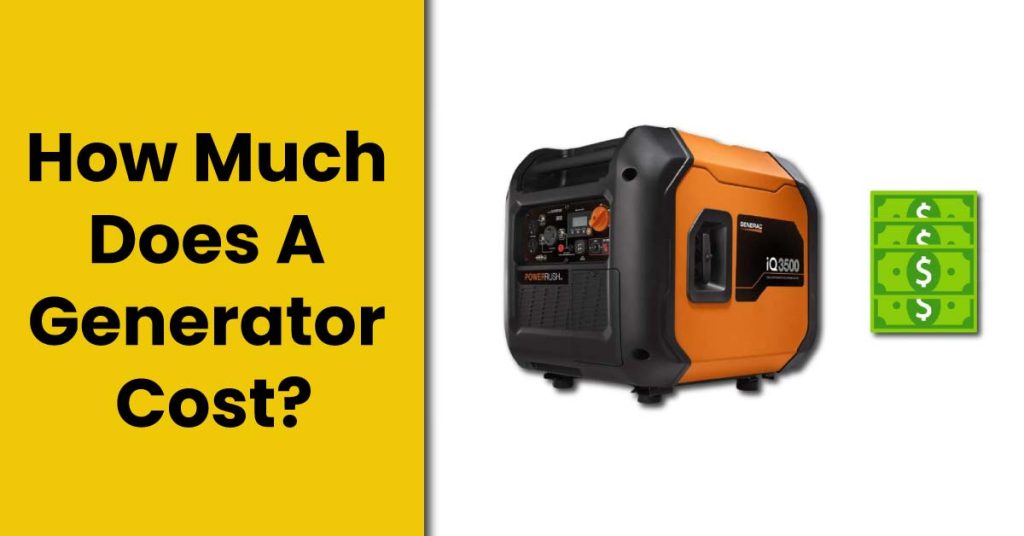How Much Does A Generator Cost? – Cost To Install A Generator
In this article, you will learn how much does a generator cost, the cost to install a generator in the home, and costs based on fuel, wattage, and generator types.
People are beginning to realize the importance of generators in areas where power outages are frequent and prolonged. That is why the sale of generators went up from 3% to 5% overall in the past 3 to 4 years.
A generator is an excellent and most reliable way to power your house or RV when solar panels can’t work anymore due to cloudy weather.
Nowadays technology has improved, and the generators are more compact, quieter, powerful, reliable, convenient, and durable compared to old noisy models.
First of all, let’s clear the confusion around the actual cost of the generators.
How Much Does A Generator Cost?

The cost of the generators is based on their size, weight, wattage, portability, purpose, and brand. The following table gives the most accurate figures. Prices may vary from brand to brand.
The most expensive one is the whole-house generator. Those are massive in terms of power production and size. They cost between “$6000 to $15000”. That includes installation costs too.
Only a handful of people purchase whole-house generators, a massive number of people in the United States buy either portable inverter generators or conventional generators.
How Much Does A Generator Cost – Generator Cost By Size And Type
| Wattage | Type | Price Range | Coverage Area |
|---|---|---|---|
| 2000 to 5000 | Portable inverters and conventional | $300 to $2000 based on the brand | For camping, RV, and Home. Small appliances |
| 7000 to 10,000 | Conventional portable, and standby generators | $1500 to $3000 | Several appliances, 15,000 BTU AC units, sump pumps |
| 13,000 to 16,000 | Conventional and standby generator, and whole-house generators | $3200 to $4500 | 1300 to 1500 sq feet home |
| 17,000 to 20,000 | Large whole-house generators | $4000 to $6000 | 1500 to 3000 sq feet home |
| 22,000 to 26,000 | Whole house large generators | $4800 to $12000 | 3000 to 5000 sq feet home |
| 30,000 to 45,000 | Conventional and standby generators, and whole-house generators | $10,000 to $16,000 | Huge luxury homes, or commercial usage |
Checkout our guide about sizing of the generator
Cost Of Generators Based On Fuel
| Type | COST |
|---|---|
| Gasoline | $300 to $3500 |
| Natural gas | $1500 to $6000 |
| Diesel | $3200 to $15,000 |
| Liquid propane | $250 to $5500 |
| Solar | $300 to $6000 |
In this section, we will sort generators based on fuel (gasoline, liquid propane, natural gas, diesel, and solar).
Gasoline Powered Generators Cost
Gasoline generators are the most cost-effective option because of the abundant quantity of gas and it is available everywhere.
They cost around $300 to $3000 depending on the size and wattage. These generators are a great camping and outdoor choice because they are mostly portable.
From 2000 watts to 10,000 watts, gasoline-powered generators can power a small RV, to an entire house depending on the number of appliances, but these units are a bit noisy.
Cost Of Propane Generators
Liquid propane can be a bit expensive but it burns slower and is cleaner. A lot of people use propane generators for tailgating and camping.
The cost of propane generators ranges from $250 to $5500. The wattage levels range from 2000 watts to 6000 watts mostly.
Liquid propane fuel is not available everywhere and it is difficult to store.
Cost Of Natural Gas Generators
The cost of natural gas generators ranges from $1500 to $6000 depending on the size and wattage. These generators are heavy-duty ones. They are mostly whole-house standby generators that can generate up to 15,000 watts of power for an entire house.
Natural gas is directly attached to these big generators (professionally installed), it is cheaper than propane and gasoline, and it is available 24/7.
Natural gas generators start automatically within seconds. These are the most expensive and most reliable types. Big houses or commercial structures use these generators mostly.
Cost Of Solar Generators
The cost of solar generators is around $300 to $6000. They require a constant fuel supply and these are a good option for people living in sunny areas.
Cost To Install A Generator
Portable inverter generators are manually operated and require installation. They are mainly used for outdoor activities like camping and tailgating.
Even if you use it for home, you don’t have to hook it up to the main control panel. Just plug in 20Amp, 30amp, or 50Amp cords to run your appliances.
Even if you want to hook it up in the breaker box, the installation cost isn’t that much compared to a standby generator.
Standby or whole-house generators on the other hand require proper installation by licensed professionals.
How Much Does It Cost To Install A Home Generator?
First of you would need a permit which costs $50 to $200 to install the generator. Then a concrete pad to protect the generator from erosion. That costs around $800 to $1000. Don’t forget the fuel cost of $30 per day.
The installation cost including the electrician’s fee can vary from $500 to $9000 depending on the size and existing structure of the property.
Frequently Asked Questions – FAQs
How much does it cost to run a generator?
The cost of fuel to run a generator for 15 to 20 minutes is close to $5. But, for frequent and prolonged power outages, you may spend up to $30 per day to run a standby or even a portable generator.
What is the cost to wire a house for a generator?
Professional electricians take $60 to $85 per hour. So a generator wiring job can cost you $600 to $800 depending on the size of the generator, and the structure of the existing property.
How long do generators last?
Depending on the size, power output, brand, fuel type, and generator type, 1500 to 3000 hours is a rough estimation. So if you use your generator for one hour per week, it will last 26 years.
Is a generator worth the cost?
The sale of generators has increased to 5% from 3% since 2013. Generators do worth the cost in areas power outages are frequent. Portable inverters generators are an excellent choice for limited power outages, camping, RV, and tailgating. Standby generators are preferred for long-term usage when hurricanes or other natural disasters cause regular outages.

Alex Black is a seasoned electrical engineer with a remarkable 8-year track record specializing in appliances, generators, and transfer switches. With extensive hands-on experience in the field, Alex possesses a deep understanding of electrical systems and their intricate workings. Throughout their career, Alex has consistently demonstrated expertise in designing, troubleshooting, and maintaining various electrical appliances.
